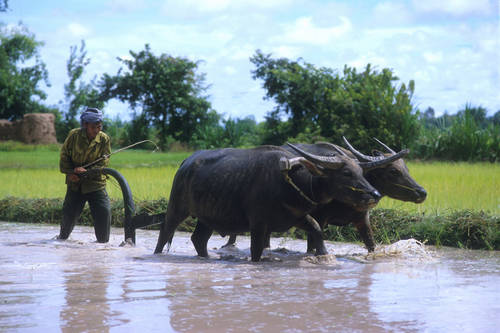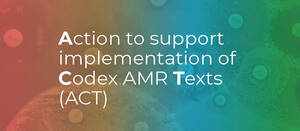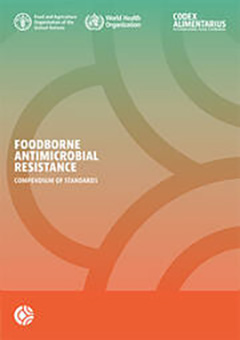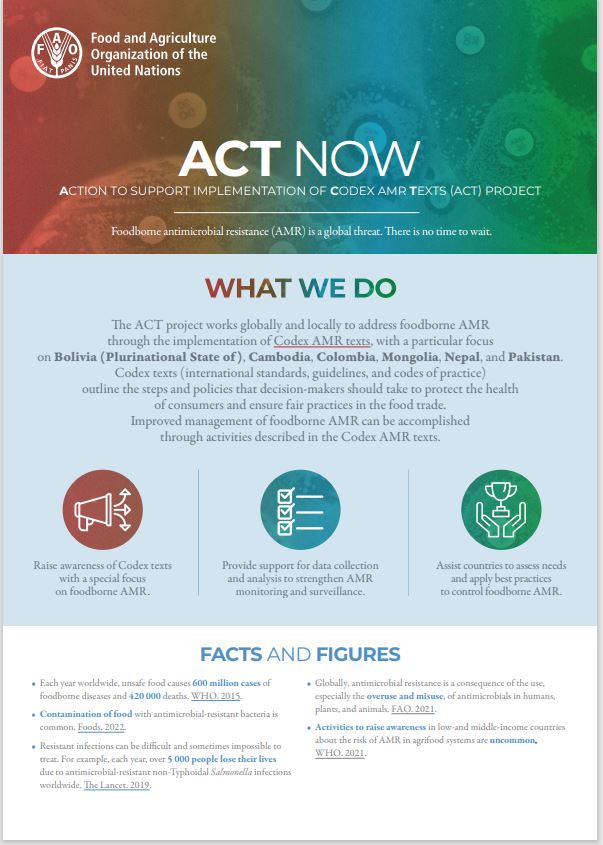 抗菌素耐药性
抗菌素耐药性
抗菌素耐药性是对全球人类和动物健康的主要威胁,且越来越令人担忧。它还影响食品安全、粮食安全,以及数百万农户的经济福利。
食品在抗菌素耐药性的发展和传播中起着重要的作用。存在于农业生产系统和食物链中的抗菌素耐药性微生物是每个人潜在的暴露途径。农业生产中良好的卫生操作,是实现食品安全的基础,也是解决抗菌素耐药性的关键。

食品法典在抗菌素耐药性中的作用
食品中的微生物(细菌、寄生虫、病毒和真菌)是潜在的食品安全危害。在食品动物中使用抗菌素(可杀死微生物或阻止其生长的药剂)与食物链中耐药性微生物的出现之间的关系是一个令人关切的问题,已成为众多国家和国际磋商的主题。
在食品动物(包括水产养殖)、园艺或人类中使用抗菌药,对人类抗菌素耐药性微生物的影响,不同的微生物和不同的地区其程度不同。
当人类摄入食品中的抗菌素耐药性微生物时,某些种类的微生物可能会致病。这些和其他种类的微生物还可能成为其他微生物(包括人类病原体)的可转移抗性决定因素的来源。
在认识到需要更广泛和多学科的应对措施来应对抗菌素耐药性的情况下,2006年,食典委成立了第一个抗菌素耐药性工作组,以制定以下方面的科学指导:如何评估和管理食品和饲料(包括水产养殖)中存在以及通过食品和饲料传播的耐药微生物对人类健康造成的风险。为了应对全球越来越关注抗菌素耐药性对公共卫生的严重威胁,最近成立了第二个工作组,将会制定科学指导,以便协调一致地管理全食物链的抗菌素耐药性。
关于兽药及其残留物、食品卫生、动物饲料的其他食品法典文本,通过在食物链中防止抗菌素耐药性的发展和尽量减少抗菌素耐药性的传播,也有助于解决抗菌素耐药性。
相关食典文本
新闻

AMR Codex Texts (ACT) project welcomes national coordinators in Bolivia, Cambodia, Colombia and Nepal
The AMR Codex Texts (ACT) project now has national coordinators in Bolivia, Cambodia, Colombia and Nepal. Jorge Berrios (Bolivia), Ana Carrizosa (Colombia) and Sakar Shivakoti (Nepal) are veterinarians with extensive experience in health management and inter-institutional coordination. Pisey Oum (Cambodia) brings his knowledge in biosafety, biotechnology and food assessment from different UN organizations.
“We need to know more in-depth about the current situation of the use of antimicrobials in Bolivia. This will allow us to plan better the actions in reducing [...]
11 November 2022

AMR Codex Texts (ACT) project in Bolivia and Colombia / coverage on national TV as workshops evaluate progress
Bolivia and Colombia held national workshops to evaluate their progress in the development of national action plans for antimicrobial resistance (AMR) in the food and agriculture sector. As part of the AMR Codex Texts (ACT) project, the workshop in Santa Cruz, Bolivia, took place on 12-14 October 2022, and 18-20 October 2022 in Bogota, Colombia. It was attended by more than 50 stakeholders from public and private sectors in both countries, including animal and plant production, food safety, public health, [...]
31 October 2022

Training on Codex standards for young professionals in Korea
Young professionals from the different agencies of the Government of the Republic of Korea attended the tenth edition of the training course “Understanding Codex” in Osong, hosted by the Ministry of Food and Drug Safety on 29 September 2022.
“We highly appreciate your efforts in protecting consumer health and ensuring fair trade practices. The Ministry believes that the partnership with Codex is very important to achieve a common goal in terms of food safety,” said Oh-Sang Kwon, Vice Minister of Food [...]
11 October 2022

Global Conference underlines Korea’s commitment with FAO in combatting antimicrobial resistance
Codex standards and the AMR Codex Texts (ACT) project were presented at the Second MFDS Global Conference on Foodborne Antimicrobial Resistance (AMR), which took place in Seoul, Korea on 27-28 September 2022. The event was organized by the Ministry of Food and Drug Safety (MFDS), the Republic of Korea, with speakers from the FAO ACT project team.
Codex Secretary Tom Heilandt commended the Republic of Korea on their commitment to advance Codex Standards. Following their generous support of the Codex Task Force on [...]
05 October 2022

AMR Codex Texts (ACT) project to be presented at the global conference in Korea
Codex standards and the AMR Codex Texts (ACT) project will be presented at the Second MFDS Global Conference on Antimicrobial Resistance, which will take place in Seoul, Korea on 27-28 September 2022. The event will be organized by the Ministry of Food and Drug Safety (MFDS), the Republic of Korea.
Codex Secretary Tom Heilandt will talk about Codex Standards on antimicrobial resistance (AMR) and will stress the importance of their implementation. There will be a special session to introduce the ACT [...]
26 September 2022

AMR Codex Texts (ACT) project in Mongolia: Discussions with veterinarians and coverage on TV
The AMR Codex Texts (ACT) project “Implementation of Codex standards to support containment and reduction of foodborne antimicrobial resistance” was recently presented in two regional meetings of the Mongolian Veterinary Medical Association (MVMA) on August 2-3 and August 6-7, 2022. These two conferences were organized by the MVMA branch councils of the Bayankhongor and Zavkhan provinces in cooperation with the Department of Veterinary Services and the FAO office in Mongolia.
“Veterinarians were introduced to the goals and activities of the project, and [...]
22 September 2022





